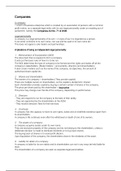Summary
Summary Company Theory - Grade 12 IEB Accounting
Covers the various sections relating to the theory of Companies, as per the IEB Accounting SAG. Includes notes from the textbook, as well as additional class, video and research information. Applicable to all IEB Grade 12s. Written by a 90% < student.
[Show more]




